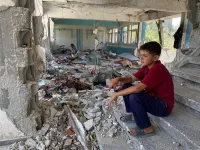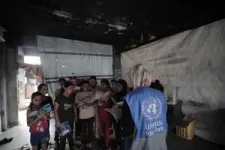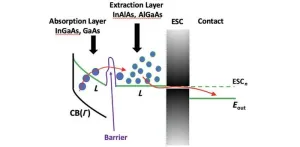(Press-News.org) The ongoing war in Gaza will set children and young people’s education back by up to five years and risks creating a lost generation of permanently traumatised Palestinian youth, a new study warns.
The report, by a team of academics working in partnership with the United Nations Relief and Works Agency for Palestinian Refugees in the Near East (UNRWA), is the first to comprehensively quantify the war’s toll on learning since it began in October 2023. It also details the devastating impact on children, young people and teachers, supported by new accounts from frontline staff and aid workers.
The study was a joint undertaking involving UNRWA and researchers at the Faculty of Education, University of Cambridge and the Centre for Lebanese Studies. It shows that Gaza’s children have already lost 14 months of education since 2019 due to COVID-19, earlier Israeli military operations, and the current war.
On this basis and using information such as global post-COVID-19 education recovery data, the researchers model several potential futures for Gaza’s younger generation, depending on when the war ends and how quickly the education system is restored.
The most optimistic prediction – assuming an immediate ceasefire and rapid international effort to rebuild the education system – is that students will lose two years of learning. If the fighting continues until 2026, the losses could stretch to five years. This does not account for the additional effects of trauma, famine and forcible displacement, all of which are deepening Gaza’s education crisis.
Without urgent, large-scale international support for education, the researchers suggest that there is a significant threat not just to students’ learning, but their overall faith in the future and in concepts such as human rights. Despite this, the study shows that education has been deprioritised in international aid efforts, in favour of other areas. “Education, simply put, is not seen as lifesaving,” the report warns.
Professor Pauline Rose, Director of the Research for Equitable Access and Learning (REAL) Centre, University of Cambridge, said: “Palestinian education is under attack in Gaza. Israeli military operations have had a significant effect on learning.”
“As well as planning for how we rebuild Gaza’s shattered education system, there is an urgent need to get educational support for children now. Education is a right for all young people. We have a collective responsibility to protect it.”
According to the United Nations Office for the Coordination of Humanitarian Affairs, more than 10,600 children and 400 teachers had been killed in Israeli military operations by August 2024, and more than 15,300 students and 2,400 teachers injured. Hundreds of thousands of young people have been displaced and are living in shelters.
Satellite images analysed by the Occupied Palestinian Territory Education Cluster have verified that over 90 per cent of schools have been damaged, many beyond repair. Since August, UNRWA has provided education in the shelters, reaching about 8,000 children, but the study warns that much more is needed to mitigate lost learning, which was already considerable following COVID-19.
The researchers calculate that 14 months of lost schooling so far have increased “learning poverty” – the proportion of children unable to read a basic text by age 10 – by at least 20 percentage points. The accurate figure may be even higher, as the calculation does not account for the wider impacts of the war on children and teachers.
The study draws together information from different sources and includes a comprehensive involvement of the Education Cluster and Cluster partners sharing their inputs, challenges and progress to enrich the report. The report provides a comprehensive overview of those broader effects. It highlights the devastating psychological consequences for Palestinian children who were already living “in constant fear and lack of hope” after 17 years of blockade, according to a 2022 report by Save The Children.
Professor Maha Shuayb, Director of the Centre for Lebanese Studies, said: “Young people’s prospects in Gaza are being extinguished and our findings show that with it they are losing hope. Education is central to stabilising that spiral of decline. If it is simply erased, the consequences will be far-reaching.”
Save The Children has estimated that more than 10 children per day have lost limbs since the war began. The report warns of rising numbers of less visible disabilities, which will put further strain on an education system ill-equipped to support children with special needs.
The study suggests that continuous shock and suffering are now shaping children’s outlook and world views. Interviewees reported some children questioning values such as equality, human rights and tolerance when these are taught in the shelters. “This is a full generation of trauma,” one humanitarian aid official said; “it will take a generation to overcome it.”
The report highlights the immense suffering teachers and counsellors have endured physically and mentally. The killings, displacement and daily realities of life during war have taken a tremendous toll on their ability to engage meaningfully in education and will, it says, adversely affect reconstruction efforts.
Professor Yusuf Sayed, from the University of Cambridge, said: “It is important to recognise teachers and counsellors have, like the rest of the population, suffered immensely. There is evidence of extraordinary commitment from educators striving to maintain learning, but inevitably the deprivation, killings and hardship are affecting their ability to do so.”
Despite a flash appeal from the United Nations Office for the Coordination of Humanitarian Affairs (OCHA), the analysis shows that just 3.5 per cent of aid for Gaza has been invested in education. Major donors like the US and Germany have neglected education in their aid packages, and blockades continue to hinder the delivery of resources on the ground.
Without more funding and access to learning, structured play and other forms of support, the report warns, the long-term repercussions for Gaza’s next generation will only worsen.
It calls for immediate steps focusing on the resumption of education, which include providing counselling, safe learning spaces, and support for students and educators with disabilities. It also calls for an immediate and permanent ceasefire and an end to occupation, in line with the International Court of Justice advisory opinion and UN recently-adopted resolution, as only then can Gaza’s education system be rebuilt. This will require a focus on recruiting more teachers and counsellors to cope with the scale of learning loss and trauma suffered by children and young people.
“Education is the only asset the Palestinian people have not been dispossessed of. They have proudly invested in the education of their children in the hope for a better future. Today, more than 625,000 deeply traumatised school-aged children are living in the rubble in Gaza. Bringing them back to learning should be our collective priority. Failing to do that will not only lead to a lost generation but also sow the seeds for more extremism, hatred and violence”, said Philippe Lazzarini, UNRWA Commissioner General.
The study also stresses that Palestinians themselves must lead the education recovery. “A ceasefire is the key for the success of any human development activity in Gaza, including education,” the authors write. “Children have seen that the international community will sit idly by as they are killed. This has left them with questions about values that schools and learning aim to instil around humanitarian principles that teachers will have to navigate.”
The full report, Palestinian Education Under Attack in Gaza: Restoration, Recovery, Rights and Responsibilities in and through Education, will be published on the REAL Centre website: https://www.educ.cam.ac.uk/centres/real/
END
Palestinian education ‘under attack’, leaving a generation close to losing hope, study warns
2024-09-24
ELSE PRESS RELEASES FROM THIS DATE:
Semaglutide improves outcomes for obese patients with common skin condition, new study shows
2024-09-24
(Wednesday, 25 September 2024, Amsterdam, Netherlands) A pioneering study, presented today at the European Academy of Dermatology and Venereology (EADV) Congress 2024, demonstrates the significant potential of semaglutide in treating hidradenitis suppurative (HS), a common and chronic skin condition, in people with obesity.1
This is the first study to explore the use of semaglutide for HS, marking a critical milestone in the search for effective treatments for this painful and debilitating condition.
HS is currently estimated to affect approximately 1 in 100 people, with obesity being a significant risk factor. The condition is characterised ...
Could GLP1RA drugs lower high iron levels?
2024-09-24
GLP1RA agonists have been increasing in popularity for treating obesity and type 2 diabetes.
With this novel treatment proving to be very effective, researchers are curious to know more about what other potential treatments it could also hold.
Researchers at the University of Michigan investigated another potential way GLP1RA drugs can be useful in treating type two diabetes associated with a genetic condition that causes high levels of iron, called hereditary hemochromatosis.
High iron levels with hereditary hemochromatosis can cause predisposition to liver disease ...
C-Path’s PKD outcomes consortium receives BAA Award for project to advance drug development tools for autosomal dominant tubulointerstitial kidney disease
2024-09-24
TUCSON, Ariz., Sept. 19, 2024 — Critical Path Institute (C-Path) is thrilled to announce its Polycystic Kidney Disease Outcomes Consortium (PKDOC) has been awarded an Autosomal Dominant Tubulointerstitial Kidney Disease (ADTKD) focused Broad Agency Announcement (BAA) contract from the U.S. Food and Drug Administration (FDA). The overarching objective of the work supported by the BAA award is to leverage collaboration with the Wake Forest Rare Inherited Kidney Disease team and its ADTKD registry, to analyze clinical and laboratory data that will help evaluate prognosis in ADTKD and help set the stage for future clinical trials.
ADTKD only affects ...
New insights into hot carrier solar cells: Increasing generation and extraction
2024-09-24
Hot carrier solar cells, a concept introduced several decades ago, have long been seen as a potential breakthrough in solar energy technology. These cells could surpass the Shockley–Queisser efficiency limit, which is a theoretical maximum efficiency for single-junction solar cells. Despite their promise, practical implementation has faced significant challenges, particularly in managing the rapid extraction of hot electrons across material interfaces.
Recent research has focused on using satellite valleys in the conduction band to temporarily store hot electrons before collection. However, ...
Clinical trial results show low-intensity therapy can achieve positive outcomes for certain pediatric leukemia subtypes
2024-09-24
(MEMPHIS, Tenn. – Sept. 24, 2024) – Clinical trial results from St. Jude Children’s Research Hospital demonstrate benefits to using genomics and early treatment response to guide risk classification of children with B-cell acute lymphoblastic leukemia (B-ALL). Traditionally, the intensity of a patient’s chemotherapy regime is guided by the National Cancer Institute (NCI) risk classification, which is largely determined by clinical characteristics such as age and white blood cell count at presentation. Through the flagship St. Jude ...
How emotion boosts memory for context
2024-09-24
Researchers at the Beckman Institute for Advanced Science and Technology demonstrated that emotion enhances memory for contextual details, challenging the view that emotion impairs the ability to remember such information.
The report was led by doctoral student Paul Bogdan, currently a postdoc at Duke University, and Florin and Sanda Dolcos, professors of psychology and neuroscience at the University of Illinois Urbana-Champaign.
Their research appears in the Journal of Experimental Psychology: ...
Specially designed video games may benefit mental health of children and teenagers
2024-09-24
In a review of previous studies, a Johns Hopkins Children’s Center team concludes that some video games created as mental health interventions can be helpful – if modest – tools in improving the mental well-being of children and teens with anxiety, depression and attention-deficit/hyperactivity disorder (ADHD).
A report on the review of studies from peer-reviewed journals between 2011 and March 20, 2024, was published Sept. 23, 2024, in JAMA Pediatrics.
An estimated 20% of children and teenagers between the ages of three and 17 in the U.S. have a mental, emotional, developmental or behavioral ...
President Obama 2012 reelection linked to significantly better mental health in Black men — but only those with a college education
2024-09-24
Following Barack Obama’s reelection as U.S. president in 2012, the mental health of college-educated Black men improved significantly, while those who didn’t attend college reported worse mental health, according to new research from Rice University sociologists.
“Four More Years! Or So What? The Mental Health Significance of Barack Obama’s 2012 Presidential Re-Election among Black Adults” will appear in an upcoming edition of Du Bois Review: Social Science Research on Race.
Lead researcher Tony Brown, distinguished professor of sociology at Rice, said he and his co-authors were interested in following up ...
Finding the sweet spot: Machine learning reveals factors for successful crowdfunding
2024-09-24
Toronto -- Modern crowdfunding has grown from relatively modest beginnings in the late 1990s to a multi-billion-dollar financing market for all kinds of early-stage innovations. The platform Kickstarter alone went from $276 million pledged in 2012 to $7.8 billion in 2024. There are even professional project designers to help craft that winning proposal.
With stakes like those, getting the pitch right is everything.
Enter machine learning to assist. Researchers from the University of Toronto’s Rotman School of Management put four different types of this artificial intelligence application to the test, including Deep Learning. Machine learning proved not only superior ...
University of Houston unveils guideline to enhance treatment access for opioid use disorder in community pharmacies
2024-09-24
Pharmacists now have more guidance in combatting the opioid crisis and providing treatment to patients thanks to new national guidelines developed at the University of Houston College of Pharmacy. The Pharmacy Access to Resources and Medication for Opioid Use Disorder Guideline, released today, addresses critical barriers in the treatment of Opioid Use Disorder across the nation’s community pharmacies.
With approximately 2.7 million individuals in the U.S. affected by OUD, the need for effective management strategies has never been more urgent. The PhARM-OUD Guideline marks a significant advancement as ...






